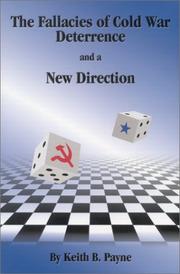
The fallacies of Cold War deterrence and a new direction
By Keith B. Payne
Subjects: United states, military policy, Deterrence (Strategy), Cold war, Cold War, Military policy, Deterrence (strategy), History, Nuclear weapons
Description: "In 1938, Prime Minister Neville Chamberlain hoped that a policy of appeasement would satisfy Adolf Hitler's territorial appetite, and he structured British policy accordingly. U.S. Cold War nuclear deterrence policy was similarly based on the confident but questionable assumption that Soviet leaders would be rational by Washington's standards.". "In The Fallacies of Cold War Deterrence and A New Direction, Keith B. Payne addresses the question of whether this line of reasoning is adequate for the post-Cold War period. By analyzing past situations and a plausible future scenario, a U.S.-Chinese crisis over Taiwan, he proposes that American policymakers move away from the assumption that all our opponents are comfortably predictable by the standards of our own culture. In order to avoid unexpected and possibly disastrous failures of deterrence, he argues, we should closely examine particular opponents' culture and beliefs to better anticipate their likely responses to U.S. deterrence threats."--BOOK JACKET.
Comments
You must log in to leave comments.